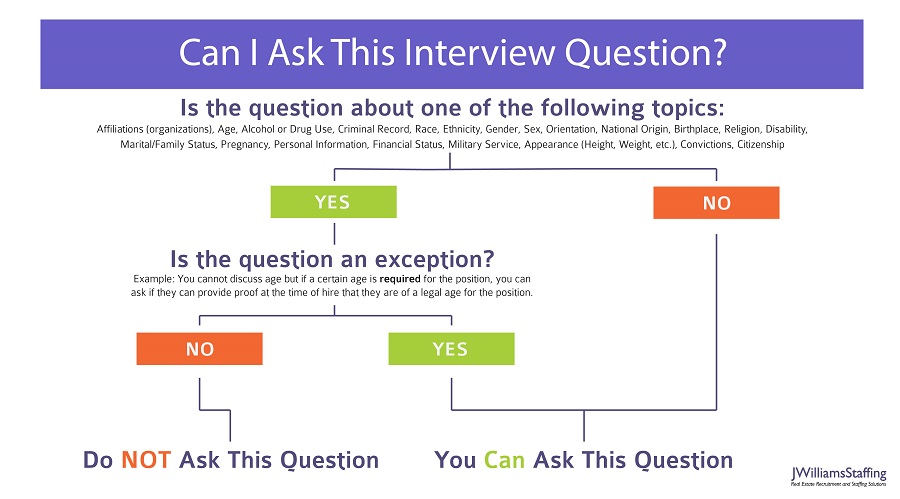Before You Go!
Sign up for our newsletter - which features professional templates, job market updates, articles, playlists, recipes, and more, sent directly to your inbox!



As an employer, you have a legal obligation to treat all candidates fairly during the interview process. An interview is a fantastic opportunity to ask questions about a candidate’s behavior, skills, and experience to learn if they are a fit for the job; however, you can’t just ask any question you want. Questions about a candidate’s race, religion, or gender (among many other things) could result in discrimination charges against you and your company, and even an investigation by the U.S. Equal Employment Opportunity Commission (EEOC), or a lawsuit.
Fair hiring practices have been in effect since The Equal Pay Act of 1963 and since then, even more hiring laws have been put into place to protect candidates from discrimination in the interview and selection process. Your interview questions should focus on finding out if the candidate has the strengths and behaviors necessary for the job and should stay away from personal questions that could make your company liable in a discrimination lawsuit. The best way to prevent yourself from violating these laws is to know what sort of information is protected and which questions NOT to ask.
In recent years, questions regarding a candidate’s pay history have become illegal in several cities and states across the U.S. These laws are put into place to protect candidates from pay discrimination and the number of states that consider financial history considered to be protected information is rapidly increasing. Using salary history in the hiring process can have major repercussions in perpetuating pay discrimination many people face in their careers. Relying on pay history to set future salary assumes that prior salaries were fairly established, but this is not always the case, and this is why these laws are now in place.
You can find a list of the cities and states affected by these new laws in the Salary History Bans article on HRDive. As this law will only continue to be implemented in various states before it is nationally recognized, companies should be adjusting their interview procedures now (rather than later) to exclude discussion of a candidate’s salary history.
The key to avoiding un-wanted legal backlash is to avoid questions pertaining to these protected classes altogether. Even seemingly harmless questions related to the topics could potentially lead to a lawsuit. The following are some questions that might seem safe to ask, but are actually illegal:
Some candidates might volunteer sensitive information related to one of these topics. When this happens, that’s okay. It’s just your job as the employer to not pursue it any further, make note of, or base decisions on the volunteered information. Due to the sensitivity of the information, it needs to be eliminated as a discussion point and selection factor.
Still unsure if you can ask your candidates a certain question? We’ve come up with this simple flow chart to help you determine whether your next set of interview questions are legal.

